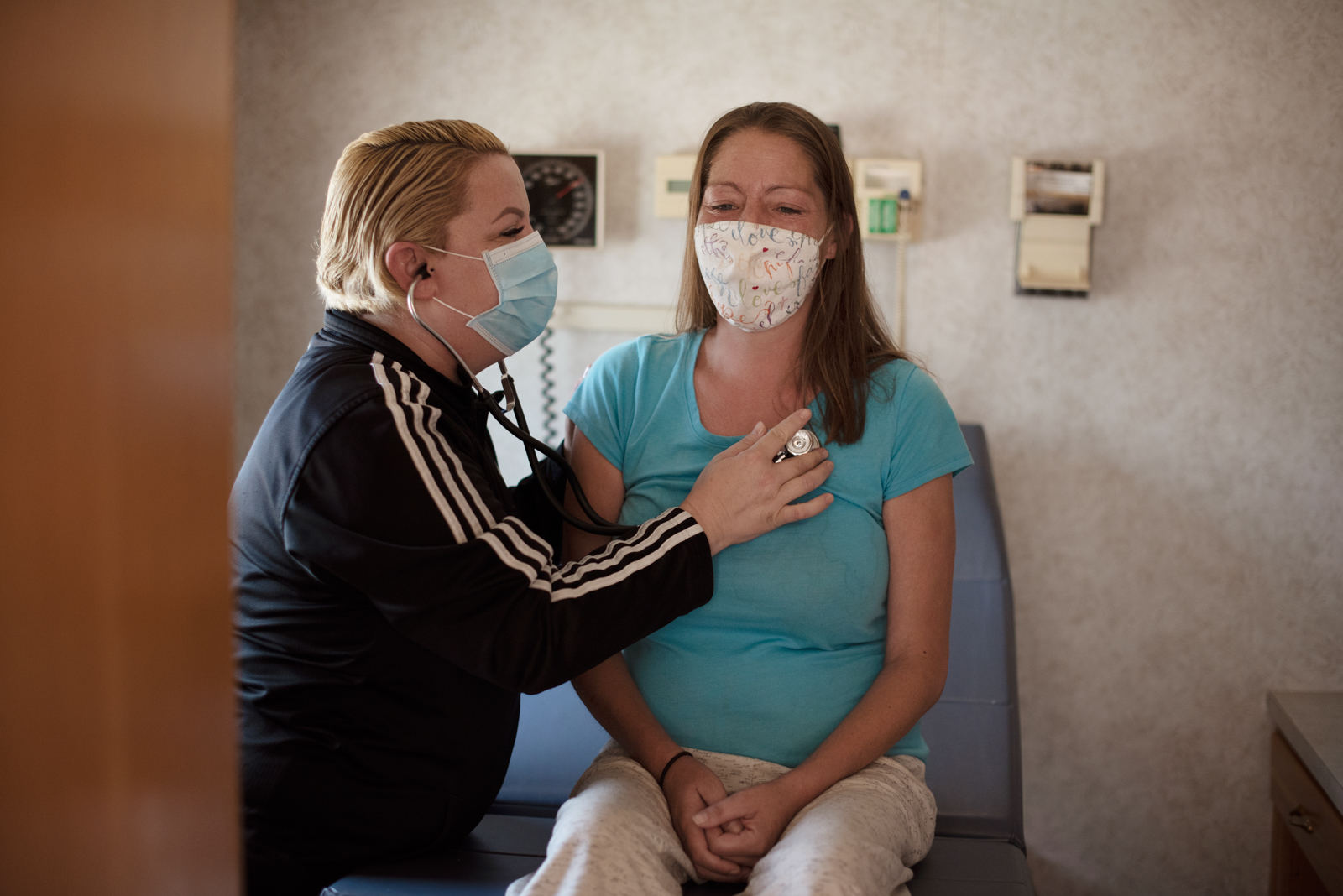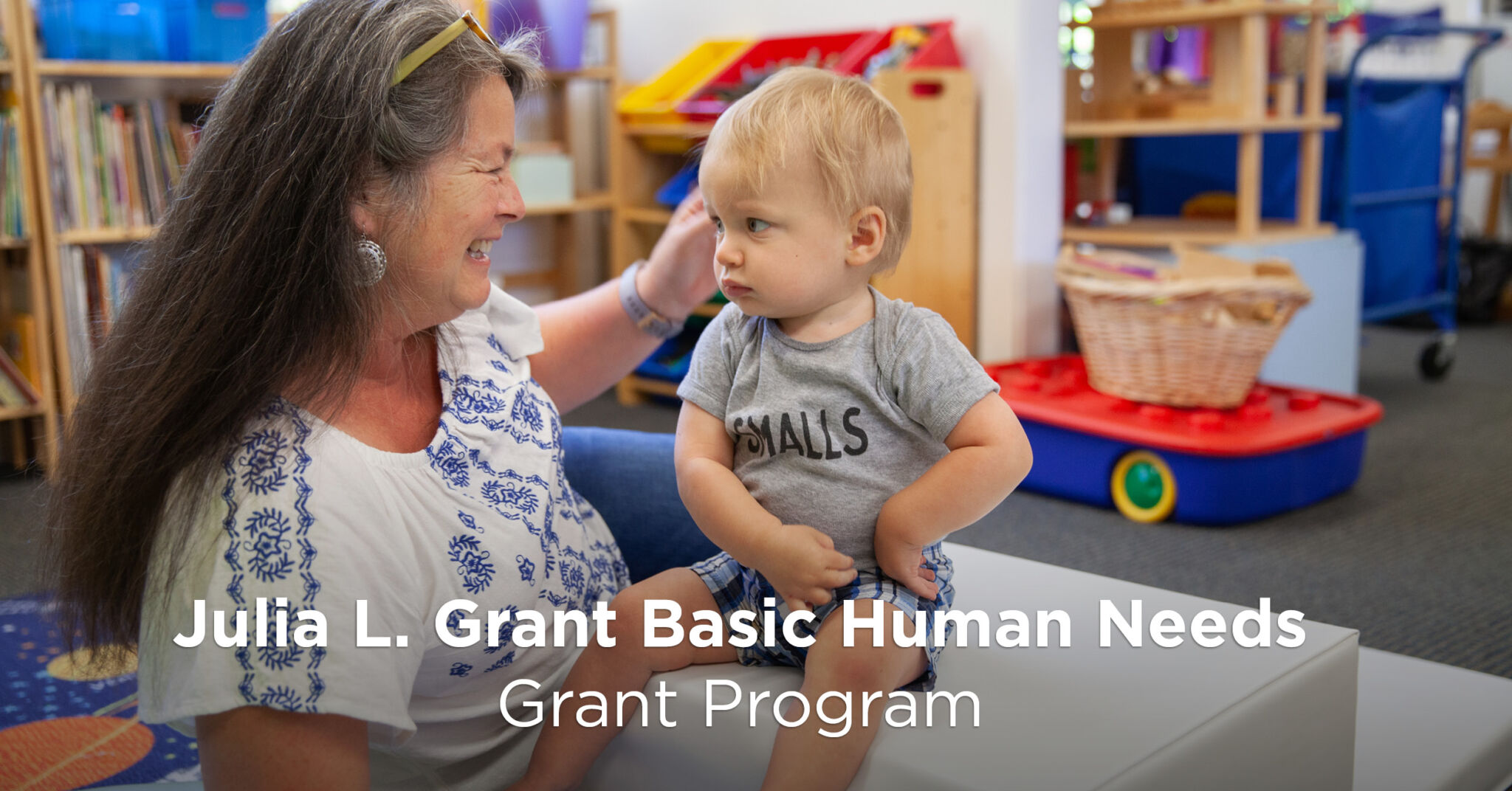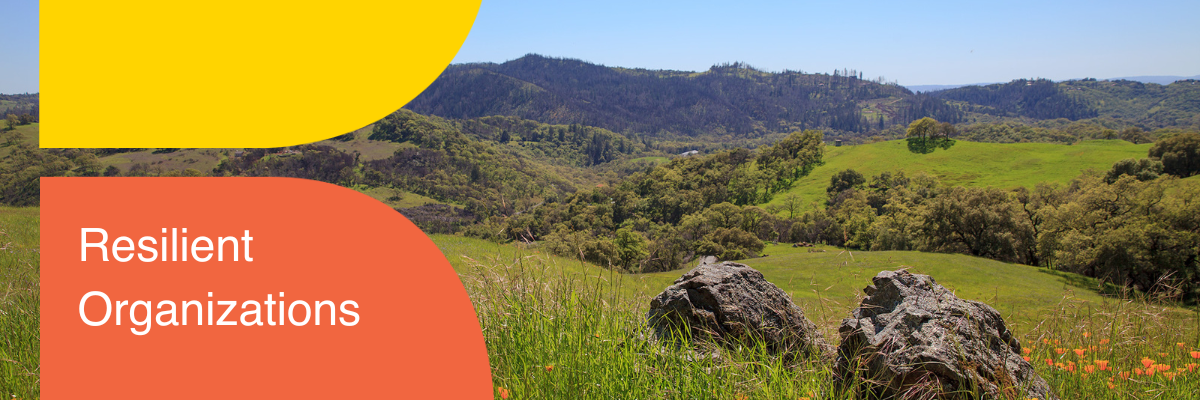The Covid pandemic presented numerous challenges to organizations serving low-income community members here and across the nation. Among those challenges was having enough emergency funds available for the surge in clients facing the loss of work and struggling to pay housing and utility costs. And for those without long-term stable housing, organizations had to ensure that shelters—operating with reduced bed counts because of social distance requirements—could safely accommodate those in need.
-
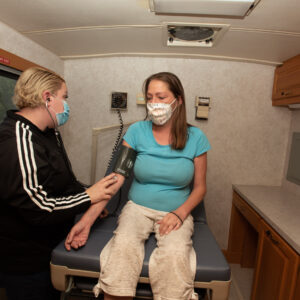
-
RN Jaclyn Ramirez will offer medical services to homeless and low-income persons with the Reach For Home Community Health and Wellness Mobile Unit every Tuesday at Living Water Church in Cloverdale, California. July 13, 2020. Photo by: © Erik Castro
-
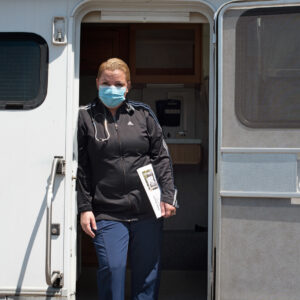
-
RN Jaclyn Ramirez will offer medical services to homeless and low-income persons with the Reach For Home Community Health and Wellness Mobile Unit every Tuesday at Living Water Church in Cloverdale, California. July 13, 2020. Photo by: © Erik Castro
-
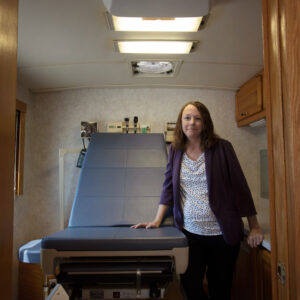
-
RN Jaclyn Ramirez will offer medical services to homeless and low-income persons with the Reach For Home Community Health and Wellness Mobile Unit every Tuesday at Living Water Church in Cloverdale, California. July 13, 2020. Photo by: © Erik Castro
-
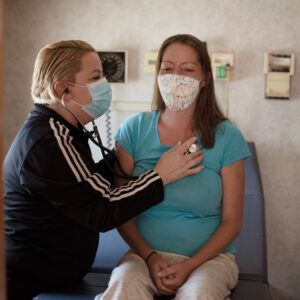
-
RN Jaclyn Ramirez will offer medical services to homeless and low-income persons with the Reach For Home Community Health and Wellness Mobile Unit every Tuesday at Living Water Church in Cloverdale, California. July 13, 2020. Photo by: © Erik Castro
For Healdsburg’s Reach For Home, solving these challenges was their highest priority over this past year.
The Reach for Home Program serves North Sonoma County—including Windsor, Healdsburg, Geyserville, and Cloverdale—and is based on three main pillars, the first of which is their Street Medicine and Outreach program.
“We’re out in the encampments making sure that not only are people surviving,” says Reach for Home Executive Director Margaret Sluyk. “We also are doing case management to move people from not having shelter to eventually getting shelter and then providing medical care to them.”
This care includes triage wound care, linking people to Medi-Cal, going to medical appointments with clients and advocating for them, and enabling clients to gain greater independence and self-sufficiency.
An additional aspect of the Street Medicine and Outreach program is a winter shelter, which Community Foundation Sonoma County’s regional affiliate Healdsburg Forever recently granted funds for. The physical space for the shelter is made possible through a partnership with St. Paul’s Episcopal Church in downtown Healdsburg. The winter shelter opened in 2018, and during that time, has served over 3,500 hot meals and roughly 3,000 bed nights. Doors usually open for those seeking beds in November of each year, around the time the weather shifts.
“We keep our eye on it, and if we need to open it early, we open it early. It really just depends on the weather,” says Sluyk.
Typically, the shelter offers up to twenty beds per night, but because of Covid, their 2020-2021 winter season cut that number in half to protect against spreading the virus. However, Sluyk, who has been with Reach For Home since January 2021, is optimistic about the shelter running at full capacity during the 2021-2022 season in part because of her team’s success at helping many in the North County houseless community to obtain vaccinations.
“We’ll keep some protocols in place just to keep everybody safe,” says Sluyk.
As a part of their outreach program, by late summer, Reach For Home will be opening a navigation center at the Victory Apartments program near the winter shelter site. The site will be staffed daily and will have computer access and resume services there, among other offerings.
The second pillar of Reach For Home’s programs focuses on long-term permanent housing. When people transition from being unsheltered and into their housing program, Reach For Home provides intensive case management and resources to ensure they can stay housed. Although Sluyk says the organization serves some families, the bulk of their housing participants are single adults.
The third pillar of their housing security focus is their eviction diversion program, which works toward making sure that people don’t lose their housing in the first place. This includes emergency rental assistance, utility assistance, and connecting people to other community resources. Reach for Home is one of roughly a dozen administrators for the County of Sonoma’s emergency rental assistance program.
Sluyk says that the need for this support has been steady, but there hasn’t necessarily been a surge in requests during the pandemic because of the moratorium on eviction. However, she expects numbers to increase when the moratorium ends.
Despite the many obstacles that the pandemic has introduced to programs serving the houseless, Reach For Home is on track to expand some services by Fall 2021. They recently launched their mobile community health and wellness unit—a large RV—to better support people on the streets and in encampments. The unit is equipped with a medical exam room and will operate as a cooling station in the hot summer months.
“The thought behind it is that [the mobile unit] is for the whole community,” says Sluyk. “If there’s a service that another provider really thinks would benefit the unsheltered or extremely low-income communities, they’re welcome to come and partner and be on the van and offer that service. We’re hoping it will be used holistically by the community.”
Jaclyn Ramirez, a Licensed Vocational Nurse (LVN) who has worked at Reach for Home for two years, is excited about the new mobile unit. She, along with two outreach workers, staff the mobile unit and engage with the North County’s houseless population in Cloverdale and Healdsburg. They hope to expand to other service locations, as well.
Ramirez, a backpack nurse and street medic, is passionate about her work and feels strongly that the best way to serve the houseless is to physically meet them where they’re at.
“I literally have everything in a backpack. And then I just go into encampments with outreach workers, and we offer services right out of their tents or on the side of the street.”
The mobile unit, she says, provides an extension of this type of service, offering a whole-person approach.
“It provides more of a confidential space where they can come in, have some water, get out of the heat or the cold, sit down and actually fill out applications or have a visit with me or charge their phone,” she says.
Ramirez anticipates that once the word gets out and people know what services are being provided, they will be happy to engage with the services they’re providing. They’ve started with offerings of health and wellness visits, coordinated entry sign-ups, Medi-Cal and CalFresh enrollments, getting people connected with primary care, behavioral health care, dental services, and more.
As Ramirez and her outreach team move into this new venture, she hopes that other organizations will want to collaborate and that the population they serve will take an active role in deciding what services are needed and wanted in the North County’s houseless community.
“For us to reach those vulnerable people, we have to be willing to get uncomfortable and go out there and get our hands dirty, so to speak,” she ways. “And it’s an approach that works.”
Between the new mobile wellness unit, the navigation center opening, vaccines being distributed more widely among the North County houseless population, and grant funds from Healdsburg Forever available to keep their housing programs stable through the next phase of the pandemic, Reach For Home continues making a positive impact for the houseless in Sonoma County.
Story by Dani Burlison, photos by Erik Castro


